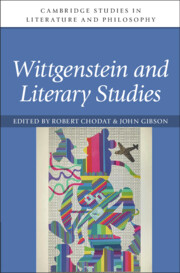Book contents
- Wittgenstein and Literary Studies
- Cambridge Studies in Literature and Philosophy
- Wittgenstein and Literary Studies
- Copyright page
- Contents
- Contributors
- Abbreviations of Wittgenstein’s Major Works
- Introduction
- 1 Writing after Wittgenstein
- 2 A Wittgensteinian Phenomenology of Criticism
- 3 Appreciating Material
- 4 A Vision of Language for Literary Historians
- 5 Wittgenstein and the Prospects for a Contemporary Literary Humanism
- 6 Storied Thoughts
- 7 Wittgenstein and Lyric
- 8 Life, Logic, Style
- 9 Wittgenstein’s Apocalyptic Subjectivity
- Index
3 - Appreciating Material
Criticism, Science, and the Very Idea of Method
Published online by Cambridge University Press: 05 December 2022
- Wittgenstein and Literary Studies
- Cambridge Studies in Literature and Philosophy
- Wittgenstein and Literary Studies
- Copyright page
- Contents
- Contributors
- Abbreviations of Wittgenstein’s Major Works
- Introduction
- 1 Writing after Wittgenstein
- 2 A Wittgensteinian Phenomenology of Criticism
- 3 Appreciating Material
- 4 A Vision of Language for Literary Historians
- 5 Wittgenstein and the Prospects for a Contemporary Literary Humanism
- 6 Storied Thoughts
- 7 Wittgenstein and Lyric
- 8 Life, Logic, Style
- 9 Wittgenstein’s Apocalyptic Subjectivity
- Index
Summary
This chapter explores the impulse to understand reading and criticism in the terms provided by the natural and social sciences, asking both what generates such an impulse and whether it can deliver on what it promises. Such an impulse dates back to the early days of literary studies as an academic discipline, if not longer, but it has returned with a vengeance in the early twenty-first century. The chapter explores two recent instantiations of the impulse: the effort to use Big Data to understand the history of the modern novel, and the hope to understand aesthetic experience in the terms developed by neuroscience. Each of these models presents itself as a radical departure from traditional aesthetic criticism, and promises to break down boundaries between disciplines in ways that would revolutionize how we understand the practice of criticism. Wittgenstein’s writing on language, the mind, and aesthetics, the chapter argues, helps us understand the misplaced assumptions and conceptual weaknesses that pervade these efforts. Instead of giving us the generalizing causal accounts that define the most coherent and rigorous scientific disciplines, criticism and aesthetic understanding arise from a kind of immersive experience, a prolonged encounter with a singular artifact, and one in which empirical studies have no clear explanatory role.
Keywords
- Type
- Chapter
- Information
- Wittgenstein and Literary Studies , pp. 62 - 81Publisher: Cambridge University PressPrint publication year: 2023

